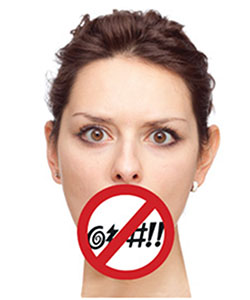I swear, it’s good for you!

May 6, 2015
There are times in our lives when we all need a word or phrase that is stronger than the rest, one that conveys the true emotion and passion of the moment. In other words, once in a while, we all need a nice, strong curse word.
Before we get into the knitty-gritty details, it is important to know what classifies a “curse” or “swear word”. According to thefreedictionary.com, “a swear word is defined as a socially taboo word or phrase of a profane, obscene, or insulting character.” In my opinion, that’s a load of… (I bet you automatically filled in the blank with a curse word). Most of us don’t use a curse word with the intention of using the definition, but we, instead, use it as a point of emphasis or emotion. We seldom consider the definition when we let “the big one” go. I believe most people use curse words as symbols, rather than words, interjecting them as stress-relievers or creating emphasis.
So, why might it be good for us?
Research has proven that swearing may reduce pain levels and increase pain tolerance. A study, published in the journal NeuroReport, measured how long college students could keep their hands immersed in cold water. During the study, the students were allowed to use curse words to help combat the pain. The volunteers reported less pain and on average endured about 40 seconds longer in the cold bath when swearing.
“Swearing is such a common response to pain that there has to be an underlying reason why we do it,” says psychologist Richard Stephens of Keele University in England, in the report. “I would advise people, if they hurt themselves, to swear.”
The second most popular use of profanity is to give strong emphasis to a statement. “What the @#$%%$ are you doing?” is much stronger than a simple “What are you doing?” It not only gives the speaker a sense of power because of the breaking of a social taboo or custom, but that is also perspective-based. It may not be socially acceptable to drop certain words in certain situations, but nothing catches others’ attention like a well-placed “#$@%$!”
Finally, research suggests, swearing often causes a slight decrease in stress levels. It allows us to vent or express anger, joy, surprise, or happiness. The same Keele University study says that cursing is, “a harmless emotional release,” and can make you feel stronger and more resilient. It says that as long as you’re not harassing people, if you’re just blowing off steam, swearing can be acceptable. In fact, it alerts others to possible stressful situations.
So, if swearing is so good for you, why do parents and administrators insist we don’t use “bad words?” Well, their worry is for those around you. They worry about the affects on the listeners. While swearing may help the user, for the most part, curse words have the opposite effect on those listening. The listeners’ stress levels may rise and, in some cases, fear is produced. Research says there are also psychological effects. If a person is sworn at on a daily basis, research says, it can be traumatic and could cause mental problems like paranoia. So, when you catch yourself swearing, you had better be prepared to explain why. It’s more than likely you’re going to get in trouble.
I’m not aware of any word that was created for the sole purpose of being profane, but it’s what we associate with the word that makes it profane. Curse words can mean so many things for so many different people. Yet one interesting common finding in the research is that the more we swear, the less emotionally potent the words become. And without emotion, all that is left is a curse word. And getting in trouble. So, the next time you smash your finger with a hammer, let it fly. But, research suggests, the f-word is probably not essential to a successful conversation with your friends.

